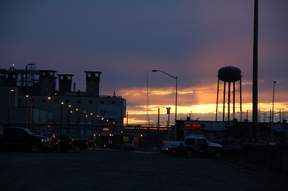



Iron ore accounts for three-fourths of Brazilian mining giant Vale’s revenue. With economic growth in China slowing and iron-ore production from Vale’s rivals in Australia speeding up, the benchmark price for the steel-making material has fallen to around $70-$75 per metric ton recently, little more than one-third of the 2011 peak of around $190 per metric ton. Mining analysts estimate that it costs Vale $67 to produce a metric ton of iron ore and ship it to China, making for a very tight profit margin at current commodity prices. Vale’s shares as of last week had fallen 42 per cent year-to-date. What to do?
Vale CEO Murilo Ferreira, in an annual presentation to investors Dec. 2, said the company is considering selling shares of between 30 per cent and 40 per cent of its base-metals division. The division is made up primarily of copper and nickel mines in Brazil, in Indonesia’s island province of Sulawesi, an hour’s flight north of Bali, on the southern tip of Grand Terre, the main island in New Caledonia, an overseas territory of France, east of Australia, and Canada, including nickel mining, milling, smelting and refining in Thompson, Manitoba, where copper and cobalt, along with associated gold, silver, platinum, sulphur, selenium and palladium deposits, are also mined.
The Initial Public Offering (IPO) would be intended, Ferreira said, to “unlock” value in the base metals division, although specifics haven’t been worked out nor has the sale been proposed to Vale’s board of directors. The Thompson smelter and refinery, which opened March 25, 1961, was the free world’s first fully integrated nickel operation and built at a cost of $185 million. Mining analysts believe Vale’s base metals division may be worth $30-billion to $35-billion, including the assumption of debt.
Rio de Janeiro-based Vale has mining operations on five continents in 38 countries. Its base metals business is headquartered in Toronto. Vale is the second largest mining company in the world by market capitalization, surpassed only by Melbourne, Australia-based BHP Billiton Ltd. (BHP), and the second-largest nickel producer after Moscow-based OAO GMK Norilsk Nickel. About 75 percent of Vale’s nickel production comes from Canada. Vale is the world’s largest iron-ore producer.
Ferreira said an IPO would hinge on a “fair price” for the base metals shares. Thompson Reuters data suggests such an IPO could raise $5-billion to $8-billion, making it the biggest in Canadian history, eclipsing Manulife Financial Corp.’s record $2.12-billion IPO in 1999.
Vale would use the money realized from an IPO pay for key projects in the midst of sliding iron ore prices. While the base metals business is highly profitable for Vale, analysts see it as a lost division with the larger company focus on iron ore.
Nickel prices peaked at $25.51 per pound on the London Metal Exchange (LME) in May 2007 just months after Vale bought Inco Ltd. in a $19.9-billion all-cash tender takeover offer deal in October 2006. In December 2008, nickel briefly dipped below $4 per pound and was $4.31 per pound on March 9, 2009 when the Dow Jones Industrial Average closed at a 12-year low of 6,547.05 – its lowest close since April 1997, losing 20 per cent of its value in only six weeks.
Scotiabank said in mid-April it now expects nickel to average $7.66 (U.S.) per pound this year. At the beginning of 2014, nickel was about US$6.50 per pound, compared to just under US$8 per pound a year earlier. The LME price today is $7.43 (U.S.) per pound, with the price being supported less by demand than supply restrictions because Indonesia, the world’s largest nickel producer, last January 2014 banned all exports of unprocessed nickel ore. Indonesia’s Constitutional Court recently upheld the legality of the ban. Nickel has risen 19 percent this year, the most among six main metals traded on the LME and has made the third-biggest gain in the Bloomberg Commodity Index of 22 raw materials.
The Wall Street Journal’s Paul Kiernan reported Dec. 2 Vale “failed to round up buyers for some nickel operations in Canada, according to two people familiar with the matter. Last year, Vale tried to get a partner to buy into the sprawling operation at Thompson, Manitoba, which includes two mills and a refinery, and this turned into an attempt to sell assets, one of the people said.” Vale’s Chief Financial Officer Luciano Siani is reported in the same story to have said the “Thompson complex isn’t for sale.”
Jennifer Maki, a chartered accountant who joined Vale in Canada almost 12 years ago in January 2003, was named Nov. 14 as Vale’s executive director of base metals as Peter Poppinga replaced long-serving José Carlos Martins as executive director for ferrous minerals.
Poppinga, who had replaced Tito Martins as chief executive officer of Vale Canada and executive director of base metals and information technology in November 2011, led 16 operating sites around the world and in Vale’s quest for asset base optimization over the last three years.
Maki, who has an undergraduate degree in commerce from Queen’s University in Kingston, Ontario, has served as executive vice-president and chief financial officer of Vale Canada since September 2007. Before joining Vale as an assistant controller for financial planning in 2003, she had worked as a chartered accountant for PricewaterhouseCoopers for almost 10 years.
In a March 2013 interview with Upfront, the in-house magazine of PricewaterhouseCoopers, her former employer, Maki observed, among other things, that Vale’s “workforce in Brazil, for example, is much more mobile and they’re much more willing to pursue opportunities outside of their home cities and towns than people are in Canada.” Maki, commenting on how Inco’s culture changed after its 2007 merger with Vale, said, ” We’ve probably become more performance driven by key performance indicators and metrics. You see it right through Vale from their compensation packages to how people are rewarded. I think part of that is coming from a country like Brazil, where there’s a very hungry group of people who have grown up in a developing country. I think they’ve instilled that here and made some major changes across our Canadian operations.”
Since last January, Maki has been the chief financial and administrative officer for base metals, as well as participating in the management of base metals businesses outside Canada. She has been a member of the Board of Commissioners of PT Vale Indonesia Tbk (PTVI) since 2007 and recently became its president commissioner.
Poppinga was born in Rio de Janeiro in Brazil. He holds a master’s degree in business administration from Fundacao Dom Cabral in Brazil. He received a degree in geology from the Federal University of Rio de Janeiro in 1980 and Friedrich-Alexander-Universität Erlangen-Nürnberg in Erlangen, Germany and a post-graduate degree in geology and mine engineering from Clausthal University of Technology in Clausthal-Zellerfeld Germany in 1984, with specialist diplomas in geo-statistics from the Universidade Federal de Ouro Preto in Minas Gerais, Brazil, and strategic mega trends from Asia Focus, Kellogg Singapore.
He speaks four languages including Portuguese, English, German and French. He worked for S.A. Mineracao da Trindade (SAMITRI) from 1984 until it was acquired by Vale in 1999, when he joined Vale as commercial director and general manager of the iron ore business in New York for Vale subsidiary Rio Doce America before moving to Rio Doce International, Belgium where he led Vale’s market and sales activities in Europe from 2000 to 2004. Between 2005 and 2007, he was president of Vale International S.A. in Switzerland, and from 2008 until the end of 2009 he was executive vice-president human resources at Vale (then Vale Inco) in Toronto.
In January 2010, Poppinga moved to Australia when he was named vice-president for base metals operations for the Asia and Pacific region where he was responsible for operations in Indonesia, New Caledonia, China and Japan.
Ferreira is a former CEO of Vale Canada, serving almost two years as the top Vale official in Canada, starting when the Brazilian mining giant finalized its purchase of Inco in January 2007. He had originally joined Vale in 1977. In 1998 he was appointed executive officer of commerce and finance at Vale do Rio Doce Alumínio S.A.-ALUVALE, a holding company of Vale that was merged into Vale in December 2003. Much of his experience is in aluminum and ferroalloys.
He was chief executive officer of Vale Inco, currently known as Vale Canada, in Toronto and executive director of nickel and base metals sales of Vale when he left the company for personal reasons at the end of 2008 and was replaced by Tito Martins. Ferreira rejoined Vale and replaced Roger Agnelli as CEO on May 22, 2011.
Vale is controlled by Valepar SA, which is owned by Previ, the employee pension fund of state-controlled Banco do Brasil SA; Bradespar SA, an industrial holding company; Mitsui & Co, Japan’s second-largest trading company; BNDES Participações SA, or BNDESpar, and Elétron – and the Brazilian government owns 12 so-called “golden shares” in Vale that gives it veto power over corporate decisions. Created on June 1, 1942 by the Brazilian government, Vale was privatized on May 7, 1997.
You can also follow me on Twitter at: https://twitter.com/jwbarker22








